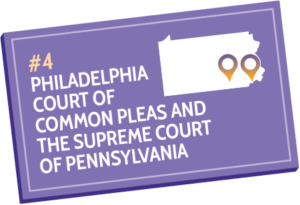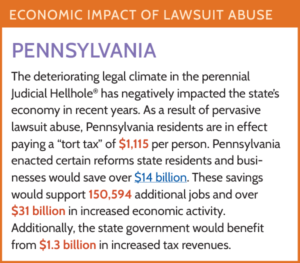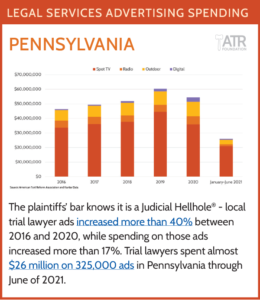LOOSE APPLICATION OF VENUE LAWS LEADS TO FORUM SHOPPING
Pennsylvania judges have made a habit of swinging open the courtroom doors to out-of-state plaintiffs. This policy benefits plaintiffs but negatively impacts Pennsylvanians. It clogs courts, drains court resources, and drives businesses out of the state leading to job loss.
At the crux of this issue is the state’s venue rule, which judges have interpreted very liberally. It permits venue in any “county where [a corporate defendant] regularly conducts business,” which allows cases to be filed in Philadelphia even when there is little to no connection between Philadelphia and the incident in question.
In addition, Pennsylvania courts have been slow to apply the U.S. Supreme Court’s 2017 ruling instructing state courts to dismiss cases that have no connection to the state. In Bristol-Myers Squibb Co. v. Superior Court of California (BMS), the Court held that a state cannot exercise personal jurisdiction over a company that is not incorporated or headquartered in that state, when the plaintiffs do not live in the state, and events related to the alleged injury did not occur there.
In October 2020, the Supreme Court of Pennsylvania openly defied the U.S. Supreme Court in Hammons v. Ethicon, which was the state high court’s first opportunity to apply the BMS decision to claims brought by out-of-state plaintiffs in Pennsylvania courts. In this instance, an Indiana resident claimed that Ethicon, a New Jersey company, made a defective pelvic mesh device. The plaintiff did not receive medical treatment in Pennsylvania, and all conduct relevant to her claim took place in Indiana or New Jersey.
The only connection between the parties and Pennsylvania was that Ethicon contracted with a Pennsylvania company, Secant, to provide the mesh and the plaintiffs’ lawyer decided that Philadelphia would be a more favorable place to sue. Doing business with third parties, however, does not automatically subject an out-of-state business to personal jurisdiction where that company is located unless there is a specific connection between the forum and the injury. Nevertheless, the Supreme Court of Pennsylvania ruled that Ethicon’s connection to Secant allowed Pennsylvania courts to assert jurisdiction over Ethicon. Contrary to BMS, the Supreme Court of Pennsylvania viewed it sufficient for a plaintiff to show a tie between the state and the “underlying controversy,” rather than the individual’s claim, for a state court to decide the case.
Following the high court’s lead, courts across the state loosely apply venue laws to allow plaintiffs to forum shop. In March 2021, a Pennsylvania Superior Court held that the percentage of a company’s overall business conducted in a county is only one factor in considering whether venue is proper. Venue may be proper for a company in any county from which it derives significant revenue, regardless of the venue’s connection with the underlying case. In Hangey v. Husqvarna Prof. Products, Inc., the defendant derived only 0.005% of its national sales from Philadelphia dealers, but the Court held that its contacts were sufficient because it had an authorized dealer in Philadelphia that sold $75,310 worth of products.
Court Refuses to Bring Defamation Venue Law into 21st Century
In November 2021, the Pennsylvania Supreme Court ignored calls from lower court judges to appropriately amend venue laws in cases arising from alleged online defamation in response to modern era technology and communication.
The Philadelphia Court of Common Pleas previously permitted a Chester Heights mayoral candidate to sue for defamation in Philadelphia even though she was a resident of Delaware County and the information was aimed at Delaware County residents. The lawsuit alleged the candidate was the victim of a smear campaign and that the defamatory statements were available to Philadelphia residents online.
Judge Arnold New based his ruling on a 1967 case, Gaetano v. Sharon Herald, and held that in a defamation action, “publication” occurs in any county where the statement is read and understood to be defamatory. Applying the law to allow a lawsuit to be filed anywhere in the state is inconsistent with the purpose of a defamation action, which is to restore a person’s name in his or her community. In his opinion, Judge New stressed that his job as a trial court judge is to apply the law, rather than “make new law.” He urged the state’s high court to reevaluate the state’s venue rules related to defamation to change the law to reflect modern communication technology and prevent clear forum shopping by plaintiffs’ lawyers. A request that also was made by Superior Court Judge Mary Murray in her concurring opinion upholding the trial court’s decision. “As technology continues to grow and its application implicates various elements of both criminal and civil law, this court will continue to be presented with novel appeals involving the use of electronic communication, the majority of which will be decided by precedent that never contemplated electronic publication,” wrote Judge Murray.
Unfortunately, their requests largely fell on deaf ears. Under this decision, plaintiffs can bring their cases in any of the multiple counties in which the online publication was viewed. This decision will lead to “unchecked forum shopping” because plaintiffs will be able to choose the most plaintiff-friendly court in which to bring their case.
A Return to Forum Shopping in Medical Liability Cases?
Constraints that have prevented lawyers from picking the most plaintiff-friendly jurisdiction for filing medical liability actions are in jeopardy. The Supreme Court of Pennsylvania is considering easing the court’s 17-year-old restraints on medical liability lawsuits. At issue is a 2002 court rule that required plaintiffs to file medical malpractice lawsuits in the county where treatment occurred, not where a jury might view the claim most favorably. The purpose was to reduce forum shopping and create a more fair and balanced playing field. Forum shopping increases the number of meritless lawsuits and drives up doctors’ insurance costs. It leads to increased costs for patients and reduces patients’ ability to access doctors.
The proposed rule change would allow attorneys to file suit for medical malpractice in jurisdictions not only where medical treatment took place, but also where the healthcare provider operates a hospital or office or where a physician lives, among other options. Of course, the state’s personal injury bar, through the Pennsylvania Association for Justice, supports the change. Plaintiffs will flock to areas like Philadelphia, where juries are more willing to award higher verdicts in favor of plaintiffs.
 The reigning No. 1 Judicial Hellhole®, the Philadelphia Court of Common Pleas & Supreme Court of Pennsylvania once again lands near the top of the list in 2021. Its drop to the No. 4 spot is not due to reforms or progress made in the state, but indicative of the number of issues plaguing California, New York and Georgia. Additionally, shutdowns resulting from the COVID-19 pandemic led to a decrease in activity.
The reigning No. 1 Judicial Hellhole®, the Philadelphia Court of Common Pleas & Supreme Court of Pennsylvania once again lands near the top of the list in 2021. Its drop to the No. 4 spot is not due to reforms or progress made in the state, but indicative of the number of issues plaguing California, New York and Georgia. Additionally, shutdowns resulting from the COVID-19 pandemic led to a decrease in activity.






